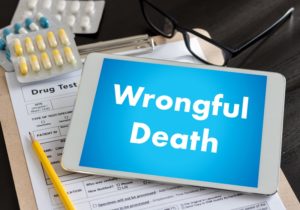 Understandably, after a loved one has passed away, you may be unsure of what to do next. Should you try to mourn your loved one and move on with the grieving process? Do you suspect that there is more to your loved one’s death and someone else is responsible? Do you think you have proof that someone else caused your loved one to die? If you believe that someone else is responsible for your loved one’s death, it is best to speak with a lawyer right away. Learn more about the circumstances surrounding their death and how someone else could be responsible, then find out what you should do next.
Understandably, after a loved one has passed away, you may be unsure of what to do next. Should you try to mourn your loved one and move on with the grieving process? Do you suspect that there is more to your loved one’s death and someone else is responsible? Do you think you have proof that someone else caused your loved one to die? If you believe that someone else is responsible for your loved one’s death, it is best to speak with a lawyer right away. Learn more about the circumstances surrounding their death and how someone else could be responsible, then find out what you should do next.
How do I know I even have a case?
When it comes to wrongful death, a lawyer, like a wrongful death lawyer knows there are a few steps you should take to begin the process of learning whether it was a wrongful death. You can begin by asking yourself these questions:
- Did a death occur? Yes, it sounds obvious but this is the first step in determining if you have a case. Without a death, you may simply be dealing with a personal injury case.
- Who caused the death? Next, you will want to know if your loved one was responsible for their own death or if someone else was involved. A slip and fall that led to your loved one’s death could be the result of negligence on the part of a property owner or it could be the result of your loved one being distracted.
- Was negligence involved? If you believe someone else is responsible, you will next want to see how negligence played a part. Did the person involved owe your loved one a duty of care and did they breach this duty? If this is the case, they may be responsible for your loved one’s death. With the above slip and fall example, if your loved one was on someone’s property and they tripped over a hazard and died from a brain injury, this would be death as the result of someone’s negligence.
If you get through these questions and believe you have a case, the next thing you will want to do is determine whether you are legally allowed to file a wrongful death case. It can be highly beneficial to speak with a lawyer at this point to determine if you are eligible to file a claim like this and see what your next steps are. For more information, reach out to a trusted local attorney today.